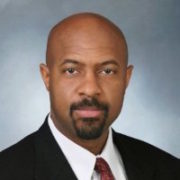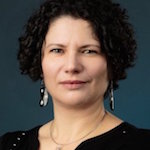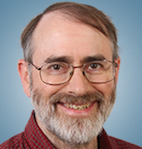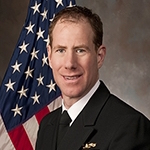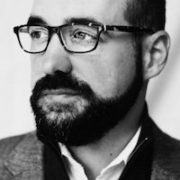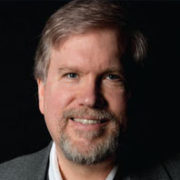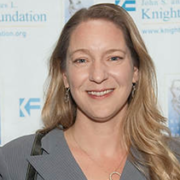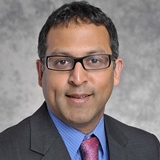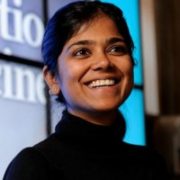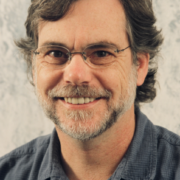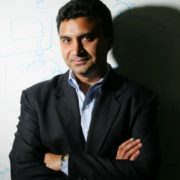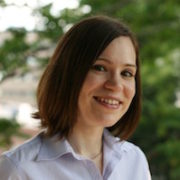Artificial Intelligence For Social Good Speaker Biographies
Bio: Austin began his career as an Honors Trial Attorney with the Criminal Section of the Civil Rights Division investigating and prosecuting hate crime and police brutality cases around the country. After approximately five years, he joined Keker & Van Nest LLP in San Francisco, as an associate working on complex civil and white-collar criminal cases, including a successful pro-bono civil lawsuit aimed at preventing racial profiling by the California Highway Patrol. In March 2014, Austin joined the White House Domestic Policy Council as Deputy Assistant to the President for the Office of Urban Affairs, Justice and Opportunity. In this position, Austin coordinates the formulation and implementation of policy covering criminal justice, civil rights, housing, labor, human services and initiatives such as Promise Zones. Austin is also a member of the My Brother’s Keeper Task Force.
Bio: Dr. Tanya Berger-Wolf is an Associate Professor in the Department of Computer Science at the University of Illinois at Chicago, where she heads the Computational Population Biology Lab. She is a Computational Ecologist who develops computational methods to solve problems in ecology, from genetics to social interactions. Dr. Berger-Wolf has received numerous awards for her research and mentoring, including the US National Science Foundation CAREER Award. She is a member of the editorial board for the International Journal of Knowledge Discovery in Bioinformatics, has served as an editor for PLoS Computational Biology and PNAS, and as a member of several academic and government advisory groups, including AAAS-FBI-UNICRI Big Data in the Life Sciences and Transnational Security Working Group. As a legitimate part of her research she gets to fly in a super-light airplane over a nature preserve in Kenya, taking a hyper-stereo video of zebra populations and learning how to identify each one of them by the unique stripe pattern. She is collaborating to build a computational system to do just that, an Image-Based Ecological Information System, and is a founding member ofIBEIS.org/Wildbook.
Bio: Thomas Dietterich is Distinguished Professor and Director of Intelligent Systems Research in the School of Electrical Engineering and Computer Science at Oregon State University, where he joined the faculty in 1985. Dietterich is one of the pioneers of the field of faculty in 1985. Dietterich is one of the pioneers of the field of Machine Learning and has authored more than 130 refereed publications and two books. His research is motivated by challenging real world problems with a special focus on ecological science, ecosystem management, and sustainable development. He is co-PI of the NSF-funded CompSustNet, a 5-year, $10M effort to develop the discipline of Computational Sustainability. Dietterich is President of the Association for the Advancement of Artificial Intelligence, and he previously served as the founding president of the International Machine Learning Society. Other major roles include Executive Editor of the journal Machine Learning, co-founder of the Journal for Machine Learning Research, and program chair of AAAI 1990 and NIPS 2000. Dietterich is a Fellow of the ACM, AAAI, and AAAS.
Bio: Dr. Elster received his undergraduate and medical school degrees from the University of South Florida in Tampa as a recipient of the U.S. Navy’s Health Professionals Scholarship Program. Upon graduation, Dr. Elster completed a general surgery residency at the National Naval Medical Center in Bethesda, Md. During Operation Iraqi Freedom, Dr. Elster served as ship’s surgeon aboard the USS Kitty Hawk while stationed in the Persian Gulf. Upon returning, Dr. Elster completed a solid organ transplantation fellowship at the National Institutes of Health and then was stationed at the Naval Medical Research Center in Silver Spring, MD, where he directed a translational research program focused on the development of improved diagnostics and therapies for serious traumatic injuries, transplantation and advanced operative imaging. Capt. Elster now serves as the 3rd Chairman of the Norman M. Rich Department of Surgery at the Uniformed Services University of the Health Sciences as well as a Professor of Surgery and Director of the Surgical Critical Care Initiative, a joint military and civilian program developing clinical decision support tools for critically ill patients.
Bio: Rayid Ghani is the Director of the Center for Data Science & Public Policy and a Senior Fellow at the Harris School of Public Policy and the Computation Institute at the University of Chicago. Rayid is a reformed computer scientist and wanna-be social scientist, but mostly just wants to increase the use of data-driven approaches in solving large public policy and social challenges. Rayid is also passionate about teaching practical data science and started the Eric & Wendy Schmidt Data Science for Social Good Fellowship at UChicago that trains computer scientists, statisticians, and social scientists from around the world to work on data science problems with social impact. Before joining the University of Chicago, Rayid was the Chief Scientist of the Obama 2012 Election Campaign where he focused on data, analytics, and technology to target and influence voters, donors, and volunteers. Previously, Rayid was a Research Scientist and led the Machine Learning group at Accenture Labs. Rayid did his graduate work in Machine Learning at Carnegie Mellon University and is actively involved in organizing Data Science related conferences and workshops. In his ample free time, Rayid works with non-profits to help them with their data, analytics and digital efforts and strategy.
Bio: Dan Hoffman is Montgomery County’s Chief Innovation Officer. He is responsible for creating and maintaining strategies and programs that generate innovative ideas in Montgomery County. The programs he oversees seek to improve service delivery effectiveness and efficiency and facilitate economic development in the County. Prior to joining Montgomery County, Dan served as a senior project manager in the Business Process Improvement and Application Development division at the US Nuclear Regulatory Commission. While there he worked on a broad range of projects including process and technology projects related to new reactor construction and information management. Prior to his time with the Nuclear Regulatory Commission he was a consultant with PricewaterhouseCoopers where he played key roles on technology and business process projects with clients such as Inter-American Development Bank and the US Treasury Department. Dan is a graduate of the 2013 class of Leadership Montgomery and serves on the Board. He is also a past member of the Board of Committee for Montgomery and currently serves as the Co-Chair of the Montgomery County Food Council. Dan Hoffman holds a Bachelor of Science degree from The George Washington University and a Master’s degree in Strategic Human Resources and Organization Development from Johns Hopkins University.
Bio: Horvitz received his PhD in 1990 and his MD degree at Stanford University. He is currently Technical Fellow at Microsoft, where he serves as director of Microsoft Research’s main Redmond lab. He has been elected Fellow of the Association for the Advancement of Artificial Intelligence (AAAI), the National Academy of Engineering (NAE), the American Academy of Arts and Sciences, and of the American Association for the Advancement of Science (AAAS). He was elected to the ACM CHI Academy in 2013 and ACM Fellow 2014. He serves on the Scientific Advisory Committee of the Allen Institute for Artificial Intelligence (AI2) and is also chair of the Section on Information, Computing, and Communications of the American Association for the Advancement of Science (AAAS). He has served as president of the Association for the Advancement of AI (AAAI), on the NSF Computer & Information Science & Engineering (CISE) Advisory Board, and on the council of the Computing Community Consortium (CCC).
Bio: Henry Kautz is the Robin & Tim Wentworth Director of the Goergen Institute of Data Science at the University of Rochester. He chairs the section on Information and Computing for the American Association for the Advancement of Science, and has served as president of the Association for the Advancement of Artificial Intelligence.
Bio: Lynn Overmann serves as Senior Policy Advisor to the United States Chief Technology Officer at the White House Office of Science and Technology Policy (OSTP). In this role, Lynn oversees Team CTO’s Social and Criminal Justice reform efforts, focused on leveraging data and technology to safely reduce incarceration, link people to effective treatment in the community, and improve human outcomes. Lynn also co-leads the White House Police Data Initiative, which focuses on using data to drive more effective community policing practices and opening police data to increase transparency and accountability. Prior to her work at the CTO’s office, Lynn was a Presidential appointee at the U.S. Department of Justice, helping to launch the Access to Justice Initiative, which focused on criminal and juvenile justice reform, and improving legal services to the poor. Additionally, Lynn spent a year deployed as a senior advisor to the Mayor of New Orleans, helping to implement a range of reforms reducing the city’s jail size, helping launch the city’s first ever plan to end homelessness, and developing a project link to domestic violence legal service providers to local law firms for comprehensive pro bono representation. Before joining the Obama Administration, Lynn was a civil rights and criminal defense attorney in Miami, Florida, specializing in police brutality and jails conditions cases. She began her career as a public defender. Lynn graduated from the NYU School of Law and received her Bachelor of Arts from Bryn Mawr College.
Bio: Reuben Sarkar is the Deputy Assistant Secretary for Transportation. He oversees EERE’s Sustainable Transportation area, which includes the Vehicle, Fuel Cell, and Bioenergy Technologies offices. He oversees annual investment of more than $600 million with a focus to reduce our oil dependence, avoid pollution, and create jobs by designing and manufacturing petroleum alternatives and more energy efficient cars and trucks.
Before joining EERE, he worked at Proterra Inc., a leading manufacturer of electric buses and fast charging stations. Most recently he was responsible for business development and strategy. During his time at Proterra, Reuben directed electric vehicle market analysis, competitive intelligence, product planning, technology road mapping, intellectual property management, utility rate and grid integration activities and other strategic initiatives.
Bio: Saria’s interests span machine learning, computational statistics, and its applications to domains where one has to draw inferences from observing a complex, real-world system evolve over time. The emphasis of her research is on Bayesian and probabilistic graphical modeling approaches for addressing challenges associated with modeling and prediction in real-world temporal systems. In the last seven years, she has been particularly drawn to computational solutions for problems in health informatics (see her recent article on this topic) as she sees a tremendous opportunity there for high impact work.
Bio: Stephen F. Smith is a research professor and Robotics Director at the Intelligent Coordination and Logistics Laboratory at Carnegie Mellon University. His research interests include planning and scheduling in the large, mixed-initiative problem solving, (re)configurable system architectures, constraint-based reasoning and optimization, and machine learning and evolutionary computation.
Bio: Milind Tambe is Helen N. and Emmett H. Jones Professor in Engineering at the University of Southern California(USC). He is a fellow of AAAI (Association for Advancement of AI) and ACM (Association for Computing Machinery) as well as recipient of the ACM/SIGAI Autonomous Agents Research Award, Christopher Columbus Fellowship Foundation Homeland security award, INFORMS Wagner prize for excellence in Operations Research practice, Rist Prize of the Military Operations Research Society and several others. Prof. Tambe has conducted foundational research in multiagent systems (a subarea of AI), for which he has received the “influential paper award” and a number of best paper awards at top AI conferences such as AAMAS, IJCAI, IAAI and IVA. In addition, Prof. Tambe pioneering real-world deployments of ”security games” research has led him and his team to receive the US Coast Guard Meritorious Team Commendation from the Commandant, US Coast Guard First District’s Operational Excellence Award, Certificate of Appreciation from the US Federal Air Marshals Service and special commendation given by LA Airport police from the city of Los Angeles.
Bio: Pascal Van Hentenryck is the Seth Bonder Collegiate Professor of engineering at the University of Michigan. He is a professor of Industrial and Operations Engineering, a professor of Computer Science and Engineering and a core faculty at the Michigan Institute of Data Science. His current research is at the intersection of data science and optimization with applications in energy, marketing, and transportation. Van Hentenryck is the author of five books published by the MIT Press and a number of optmization systems that have been widely used in industry and academia, including the OPL system which is now an IBM product.
Bio: Hanna Wallach is a researcher at Microsoft Research in New York City and an assistant professor at the University of Massachusetts Amherst’s School of Computer Science, where she is one of five core faculty members involved in UMass’s recently formed Computational Social Science Initiative. Hanna develops new machine learning methods for analyzing the structure, content, and dynamics of complex social processes, such as the US political system, the US patent system, and software development communities. Her research contributes to machine learning, Bayesian statistics, and, in collaboration with social scientists, to the nascent field of computational social science. Her work on infinite belief networks won the best paper award at AISTATS 2010. Hanna has organized several workshops on Bayesian latent variable modeling and computational social science. She also co-founded the annual Women in Machine Learning Workshop. Hanna holds a B.A. in Computer Science from the University of Cambridge, an M.S. in Cognitive Science and Machine Learning from the University of Edinburgh, and a Ph.D. in Physics from the University of Cambridge.

